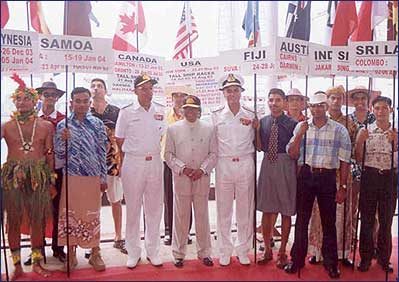INDIA DEFENCE CONSULTANTS
|
WHAT'S HOT? –– ANALYSIS OF RECENT
HAPPENINGS |
|
THE INDIAN NAVY’S ‘MONROE DOCTRINE’? An IDC Analysis
|
|
New
Delhi, 11
April 2004
Indian Navy's sail training ship INS Tarangini. A Navy helicopter escorted the ship seen here sailing outside Kochi harbour, with President A P J Abdul Kalam on board. In
the last six years the Indian Navy has carried out some stupendous
tasks under the able command of Admirals Sushil Kumar (former CNS)
and Madhvendra Singh the present CNS. The latter is due to retire on
31 July at age 62 and all things being equal, we hope he will go on
to greener pastures in the service of the Nation. Both Admirals need
to be congratulated for steering the Navy to higher tides. The
magnificent International Fleet Review in Feb 2000 and more recently
the “Round The World Voyage in 16 Months”, that INS Tarangini,
the Navy’s only sail ship, had just completed were both remarkable
achievements. India is certainly on the world scene to become a
regional power and in this endeavour the Navy has an important role
to play.
President Kalam, CNS Admiral Madhvendra Singh and crew of Tarangini dressed in costumes of the countries visited and holding their flags. The
President received Tarangini at Kochi in Kerala and the media were
specially flown down in an IAF plane to be wined and dined to report
the event. The
achievement did not get the attention it deserved, as all media were
more concerned with the ongoing election process and its results. An
important statement was also made by the CNS about a new ‘Navy
Doctrine’ to be formally revealed at the Naval Commanders
Conference in progress at Vishakapatnam –– just after the Army
Chief had called for a joint doctrine for the three services ––
at his recently concluded Army Commanders Conference. This is an
interesting development and we are sure there was close coordination
on this. In
the Navy, being a small service, the Naval Chief is all-powerful
with powers to moderate the confidential reports of Captains and
above. He also has great authority to deal with Foreign Navies as
our ships travel far and wide and the MEA gives a lot of leeway to
the Navy to regulate the visits and connected programmes. Recently
our ships have been going far and wide in greater numbers including
to China. The Coast Guard too has moved out to Japan and two of
their ships were in Malaysia recently. The
Navy Doctrine therefore is likely to impinge on India’s littoral
states, unlike an Army or Air Force Doctrine, which are likely to be
confined to deal with war and defence of the homeland. Admiral
Vishnu Bhagwat had begun the exercise to have a formal naval
doctrine, which now seems more complete and though we do not have
details, the present Navy Chief needs to be congratulated for
steering it through. Parts
of it or the whole doctrine needs to made public for the Nation
–– for politicians and academics to appreciate and debate the
Navy’s viewpoint, which in any case should be the nation’s
viewpoint –– a sea map so to say like a road map.. We
had reviewed the books by BG Deshmukh and J N Dixit and explained
that the Military in India are not consulted in matters leading to
geo strategic decisions. However, we are clear in our perception
that the armed forces must be more involved in matters pertaining to
ocean and nuclear security, relations with the littoral countries
and in the decision making for the Indian Ocean. In
the past an Army Chief, Gen Rodrigues had dared to put forward some
hard words from his heart, which he later had to retract when George
Fernandes raised a rumpus in Parliament. In the Generals words,
"Good governance is a part of the Military's duty too."
After that incident the army has kept its remarks within its
barracks, which is a pity, and if media are to be believed the IAF
will be happy if its Squadrons are increased and no Chief of Defence
Staff is appointed! It
is only the Navy that has to think beyond India’s shores. We are
convinced that India can now contribute to a multi- or even a tri-
polar world in this region. It has a powerful military and vast
economic potential. To achieve this "Strategic Understandings
"in the region are what India must think of and the work seems
to have begun by George Fernandes –– he calls them Defence
Cooperation Agreements possibly not to antagonize the MEA. India
is entering into understandings with neighbors in Indian Ocean
Security and even Pakistan is talking of cooperation, though India
objects to its inclusion in the ASEAN, ARF and IOR for some
inexplicable reasons. We also continue to neglect Myanmar, despite
its acceptance by ASEAN as a member since July 1995. Additionally,
India must strive to gain its rightful permanent seat in the UN
Security Council also. It now has more support for this nomination. We
presumes it is this confidence and support from the Government that
has sparked the Navy to articulate its Doctrine in a 148 page
document –– if Saikat Datta of Indian Express is to be believed
–– as he appears to have been briefed on it. The little that we
have discerned is that the Indian Navy has propounded a sort of mini
‘Monroe Doctrine’, to safeguard India’s interests in the
Indian Ocean. We congratulate the Navy and hope an unclassified version or all of it is published so that the politicians, bureaucrats and leaders of Industry are in sync. We offer these thoughts as we congratulate the ‘round the world’ voyage of INS Tarangini and marvel at the storms the sailing vessel braved including a nasty one in the Atlantic. In the Navy they say ‘BRAVO ZULU’ and ‘SPLICE THE MAINBRACE’. |

